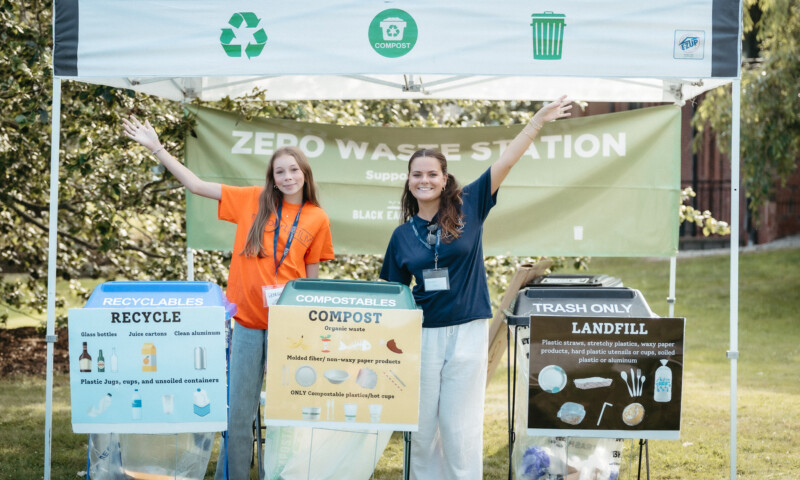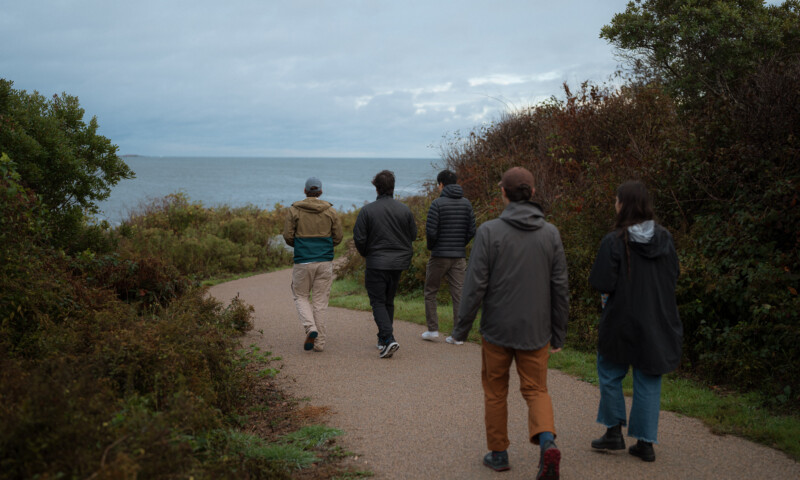The Great Hack opens enigmatically with glimpses of millennial Brittany Kaiser as a Faustian figure at the Burning Man festival. If Woodstock captures something key about the liberal cultural revolution of the 1960s, perhaps the techie libertarian paradise of Burning Man – whose mottos include “Leave No Trace” and “Why Not?” – is the proper launch pad for a documentary about the dystopian uses of data analytic to manipulate US and UK election results. The Great Hack is an important new Netflix-produced documentary about many things, but the most riveting narrative thread in my opinion is Kaiser’s antihero journey from human rights activist to underpaid social media innovator for the Obama campaign to highly-paid, respected young senior executive shaping election microtargeting at the now infamous Cambridge Analytica data analytics firm – fighting the new 21st century culture wars not with peace and love but data and brimstone. And heads-up, what to make of her newest identity as a data-rights activist? Yes. It’s complicated.
Early in the documentary there is a clarifying confrontation where Brittany Kaiser is directly asked in a leading way to agree that Cambridge Analytica was contravening people’s human rights – and she emphatically says: “No!” Let’s follow her on this. In the sequence, Kaiser insists on first establishing her backstory credentials as a lifelong human rights activist and someone engaged in progressive election politics from the time she was fourteen through her work on the Obama elections. She pointedly asks the viewer to be mindful that it was the Obama campaigns that mainstreamed the use of social media to directly connect with voters and persuade them to take action. After this, in 2014, the promising young talent was personally recruited to Cambridge Analytica by the CEO. Heady stuff. Alexander Nix offered her not only mentorship but a better job with cutting-edge career learning potential – at a moment in her life when Kaiser’s parents were in financial difficulty from ruinous health care costs and home loss. Kaiser insists that her boundaries included never taking calls from or having contact with far-right authoritarian leaders in Europe who apparently sought her out as a political consultant.
In this film sequence, Kaiser is emphatic that Cambridge Analytica’s business model didn’t care about “everyone’s” data, but only the market niche of what she calls the “persuadables“. These were uninvolved or apathetic potential voters whom the business believed could swing a close election. She suggests in this interview that Cambridge Analytica was merely offering to “educate” under-served voters on their options. What was wrong with that? And yet, as we will see, the civic engagement goal of this kind of micro-targeted election education on triggering issues could devolve to divisive propaganda, or possibly even something like military-grade psy-ops. What was new was Cambridge Analytica’s advanced abilities to identify the triggers for these previously untapped voter pools, and then bombard these individuals with micro-targeted ads designed to shape their world view and lead to voting action or continued apathy. The implication is clear: Obama paved the way for using social media in a presidential election and it gave the Democrats a successful edge. So why blame the Republicans in the 2016 election for running, for example, almost 6 million visual Facebook ads to Clinton’s 66,000? Cambridge Analytica’s so-called psychographic microtargeting bombardment of apathetic or neurotic voters fed up to a billion personalized political ads in the lead up to the election. And it worked. So where is the line?
As a tactic, psychographic microtargeting shares with gerrymandering, for example, or Citizens United, the Machiavellian goal of doing whatever it takes to “legally” manipulate an election in order for your side – or your client – to attain their goal and win. Welcome to the real world. Elections are big business and we are still sorting out what kind of civic leadership we expect from tech companies. Kaiser presses the point further. What is the difference, she asks, between deploying psychologically-targeted propaganda to convince young at-risk boys in developing countries not to join terrorist groups, and the savvy use of Facebook and other social media platforms to convince disaffected youth in Wisconsin to take action on behalf of your candidate? I appreciate her candor asking difficult questions, and think this line of inquiry is one of the film’s most important contributions to our current conversation on how to achieve election integrity going forward. What kind of information – what kind of “education” – should shape the educated citizenry that is at the heart of democracy?
The Great Hack plants the seed for thinking about the long history of manipulative propaganda interference in the national elections of developing countries. For example, there is the troubling case study of how Cambridge Analytica’s parent company apparently used its data analytics toolkit to successfully influence a recent election in Trinidad. The tactics, techniques, and procedures went as follows. Understand that the goal was to suppress youth voter turn-out by crafting a sophisticated social media campaign that didn’t in any way appear “political”. To achieve this, they created a “Join the Gang” marketing campaign that was trendy in an Instagram-friendly way. Fake social media influencers and micro-targeting followed to make it fashionable to resist the government by being simultaneously engaged in social media but politically apathetic and thus disinclined to make it to the ballot box – the only metric that matters in an election, after all. The film documents Cambridge Analytica’s belief that their marketing campaign successfully influenced 40% of 18-35 year olds and delivered the 6% swing vote that decided the election. One Cambridge Analytica premise is particularly worth pointing out here. Their campaign was grounded in the assumption that more Afro-Caribbean youth would buy in completely and not vote, whereas more Indian youth would engage with the campaign but ultimately act on what their parents told them to do. That is, hearing independent cross-generational advice about what it means to be an engaged citizen mattered. I’d be curious to read more about the data around this troubling case study. What is undeniable is the way the campaign strategy was based on dividing groups using stereotypes and emotional trigger points that apparently did generate a desired marketing outcome. However, it also suggests a counter-strategy to pay attention to going forward. Cross-generational mentoring and opportunities for meaningful jobs will continue to be critical preconditions for civic engagement. We can all seek out ways to be empowering, mentoring wayfinders in these changing times.
The Great Hack pitches itself as being a documentary about data rights, but it skates over much more troubling issues in my opinion. Late in the film, Brittany Kaiser makes the claim that the advanced data analytics that are central to psychographics had been classified in the UK as weapons with government-imposed export restrictions to prove it. Is this is the red line we need to look at? (Note that cryptography was export-restricted as a weapon in the US until as recently as the 1990s when the internet made this goal unenforceable.) When should micro-targeted information be considered education? Propaganda? A government-restricted weapon? As the documentary’s segment on the Trinidad election suggests, first-world countries tolerated advanced propaganda interference in the national elections of developing countries and have only now become outraged in a kharma moment because these same tools were – surprise! – being used by the same company in the UK to deliver the Brexit vote, and soon after in the 2016 US presidential election which delivered a surprise outcome decided by 70,000 voters in three swing states. But that is precisely the kind of result Cambridge Analytica was in the technology business to deliver. So what surprises us? And what does this capability portend for the future of democracy when elections default to sophisticated brand marketing campaigns open to manipulation by deep pockets with access to protected cutting-edge advanced data analytics technologies?
History will likely judge that democracy entrepreneurs successfully took advantage of innovations in big data analytics to deliver election results that have shaped the early 21st century in outsize ways. Looking ahead to the 2020 election, some of these techniques will play out on a more level playing field without the same element of surprise. So, what might be the deciding factor this time? In my opinion, the data rights agenda is ripe for abuse, and unhappily, The Great Hack plays straight into this morass. Britanny Kaiser, the enigmatic Cambridge Analytica whistleblower first introduced in the film at Burning Man, is once again sending ambivalent messaging about her political alignment. My caution flags went up when I saw she had now moved on to build a social media campaign around #OwnYourData. Will data rights and outrage around radically changed privacy norms be the Instagram-ready divisive brand message alienating progressive youth from election engagement in 2020? I hope not; here’s why.
We are living through a profound technological revolution and I encourage everyone I meet to find the inner strength to be resilient, upskill with a growth-mindset and invest first in your own digital literacy. Be curious about the nine lives of data and how all those ones and zeroes zoom around cyberspace. Learn about options for securely storing your data, and the limits to the security you can hope for. (There is no zero risk on the internet, but you can build a zero trust model network; find out how!) Commit to the most basic security hygiene, like strong passwords. Get to know the lifecycle of your metadata. Join the digital revolution by taking advantage of the many excellent online learning platforms. Encourage yourself or someone you know to become a real data scientist, leveraging for starters the excellent educational tools out there for anyone to learn from – for free! Wrap your head around the fact that, like it or not and without being asked, our Enlightenment sense of privacy has been changed forever. Rather than complain (with the futility of a Luddite) shift your energy forward to contribute and help shape the best possible outcome. Be on the alert for 2020 election-apathy messaging around perfectionist outrage at any kind of trending #OwnYourData campaign. I’m a historian and identity-theft survivor who had to go on her own deeply painful journey to get to my current point of view. But here I am feeling so much urgency around the need for digital literacy as a precondition for policy dialogue. Yes, I know it’s a beautiful Enlightenment ideal to say that data-rights are a human right, but the fact is we live in a transformed 21st century. Deal with these kinds of facts about our new sensor-immersive, data-drenched environment:
- “Over 2.5 quintillion bytes of data are created every single day, and it’s only going to grow from there. By 2020, it’s estimated that 1.7MB of data will be created every second for every person on earth.”
- By the year 2020, there will be more than 30 billion connected Internet of Things [IoT] devices.
- What happens in an internet minute? Check this out.
Be part of the solution by becoming a digitally-literate citizen. Learn best practices for cryptography, authentication, and IAM – Identity and Access Management. Have an informed opinion on the merits of various encryption options and why https matters. Learn about the different kinds of spectrum, and basic first steps for securing your network and your mobile devices. Turn to NIST resources for small businesses. Be aware of how the privacy/security conversation is working out globally now that completely different sovereign internet models exist among different competing global powers. Keep a copy of the CompTIA Security+ exam book on your nightstand and slowly soak it up. Big data in a sensor-immersive environment is here to stay, and the 2020 election will be a great opportunity to dialogue about this change and how we might best move forward with both grief and hope as a transformed 21st century model democracy.
My call to action is this: I encourage viewers of The Great Hack to practice cross-generational mentoring and job creation opportunities. Most importantly, please face up to your own tech literacy gaps and commit to at least learning basic digital literacy. Start, for example, with this free course I personally loved: “The Bits and Bytes of Computer Networking“. Explore further from there. Learn what the 7-Layer OSI model of a stack is, and be critically aware about the dangers of Layer 8 – the human layer where social media oversharing doesn’t require advanced technology to exploit the private information you freely give away. If you are especially concerned about privacy, learn about Social Engineering, #OSINT, and the history of the “con” – all of which predate the internet and really are as old as human nature. Learn from @_sn0ww, the IBM X-Force Red-Team Chief People Hunter, who shared the history of the “con” with her audience at this month’s riveting Layer 8 Open Source Intelligence Conference held in Providence. She highlighted George C. Parker, the American who famously sold the Brooklyn Bridge multiple times in his career as the most successful con dealer in US history. How did he do this? Some social engineering techniques never go out of fashion, so commit to Red Team/Blue Team awareness training, and embrace critical thinking. The Great Hack ends with Professor Carroll, the data rights activist, asking: “Can I be Manipulated? Can you?” Know how you would answer, and why.
I hope watching this early screening of The Great Hack will lead you to deepen dialogue about the issues and prompt urgent digital literacy education this summer and into 2020. Our future as a nation led by an educated citizenry depends on all of us understanding the change that is upon us, and then joining together to use our talents to build the best possible tomorrow.
The Netflix-produced documentary, The Great Hack, premiered at Sundance in early 2019 and will be distributed widely this fall. Right now, there are no trailers and limited reviews – of which this is one. Don’t miss the chance to see The Great Hack, for yourself, for free, this Thursday June 20, 2019 as the first public outdoor documentary of the newportFILM summer 2019 program. This is also a special opportunity to stay after the film for Q/A with The Great Hack directors Karim Amer and Jehane Noujaim, and film subject David Carroll. So, head to the Newport Art Museum at 76 Bellevue Avenue, Newport, Rhode Island with your picnic blanket. In a physical expression of bridging, the street between the Newport Art Museum and the Redwood Library & Athenaeum will be closed to traffic to accommodate as large a viewing public as possible for this screening.
The Newport Art Museum and Redwood Library lawns open Thursday June 20, 2019 at 6:30pm and The Great Hack begins at 8:50pm. As always, this is a BYO picnic public event with food truck options and live pre-film music. For more information or to become a newportFILM member, head to https://newportfilm.com/
By Nancy Austin, PhD – newportFILM Outdoors Summer 2019 Humanities Blogger.
With support from the Rhode Island Council for the Humanities.




